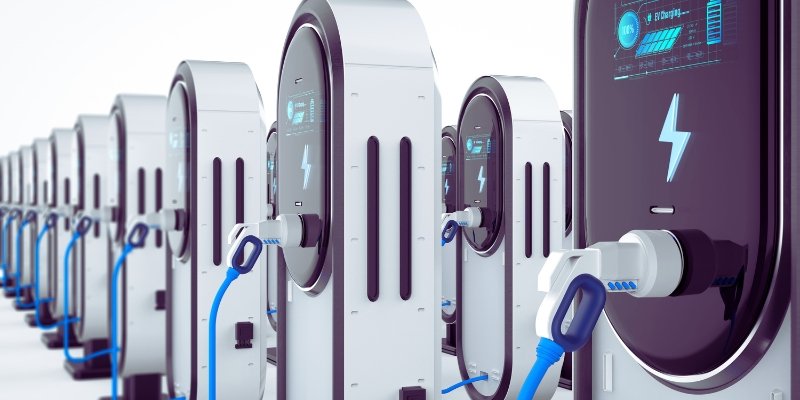Establishing an Electric Vehicle Charging Station Network Business in Singapore: A Guide for Aspiring Entrepreneurs

As the world shifts towards sustainable energy solutions, the demand for electric vehicles (EVs) is skyrocketing. In Singapore, the government is actively promoting the adoption of EVs through various initiatives, including incentives for EV buyers and a commitment to expanding the charging infrastructure. Establishing an electric vehicle charging station network business in Singapore presents a unique opportunity for aspiring entrepreneurs to capitalize on this growing market. This guide will explore the reasons to start this business, the steps involved in launching it, the challenges to consider, and the financial planning aspects necessary for success.
Reasons to Start an Electric Vehicle Charging Station Network Business

Government Support and Incentives: The Singaporean government has set ambitious targets for EV adoption, aiming for 60,000 charging points by 2030. This supportive regulatory environment provides a favorable backdrop for entrepreneurs looking to enter the electric vehicle charging market.
Growing Demand for EVs: With an increasing number of consumers opting for electric vehicles, the demand for charging stations is expected to rise significantly. This trend creates a lucrative opportunity for businesses that provide reliable and accessible charging solutions.
Sustainability and Environmental Impact: Establishing an electric vehicle charging station network aligns with global sustainability goals. Entrepreneurs can contribute to reducing carbon emissions and promoting cleaner energy, appealing to environmentally conscious consumers.
Diverse Revenue Streams: A charging station network can generate revenue through various channels, including charging fees, partnerships with businesses for on-site stations, and advertising opportunities. This diversity can enhance financial stability and growth potential.
Detailed Steps to Establish an Electric Vehicle Charging Station Network Business

Conduct Market Research: Begin with thorough market research to understand the current landscape of EV charging in Singapore. Identify potential competitors, target locations for charging stations, and consumer preferences to refine your business model.
Develop a Business Plan: Create a comprehensive business plan outlining your vision, mission, target market, product offerings, marketing strategies, and financial projections. This document will serve as a roadmap for your business and is essential for securing funding.
Choose Your Locations: Identify strategic locations for your charging stations, such as shopping malls, office complexes, residential areas, and highways. Accessibility and visibility are critical factors in attracting EV owners to your stations.
Legal Structure and Registration: Decide on the legal structure of your business, whether it be a sole proprietorship, partnership, or private limited company. Register your business with the Accounting and Corporate Regulatory Authority (ACRA) in Singapore to obtain the necessary licenses.
Partner with Charging Technology Providers: Collaborate with established charging technology providers to source high-quality charging equipment. Ensure that the technology you choose is compatible with various EV models to attract a broader customer base.
Secure Funding: Explore various funding options, including personal savings, bank loans, and government grants aimed at supporting green initiatives. Consider seeking partnerships with investors who share your vision for sustainable transportation.
Build Your Network: Establish relationships with property owners and businesses to secure locations for your charging stations. Collaborating with shopping centers, hotels, and restaurants can provide added benefits, such as increased foot traffic.
Marketing Strategy: Develop a marketing strategy to promote your charging stations. Utilize social media, local advertising, and partnerships with EV manufacturers to raise awareness and attract customers.
Launch and Monitor Performance: Once your charging stations are operational, monitor their performance and gather feedback from users. Use this information to improve services and expand your network based on demand.
Challenges and Considerations for Both Local and Foreign Entrepreneurs

While establishing an electric vehicle charging station network business offers significant opportunities, there are challenges to consider. Local entrepreneurs may face competition from existing players in the market, while foreign entrepreneurs might encounter regulatory complexities and cultural differences.
Additionally, securing prime locations for charging stations can be competitive and may require negotiations with property owners. Entrepreneurs must also stay updated on technological advancements in charging infrastructure to remain competitive.
Financial Planning Aspects

Financial planning is critical for establishing an electric vehicle charging station network business. Entrepreneurs should consider the following aspects:
Startup Costs: Estimate the initial investment required for equipment, installation, permits, and operational expenses. A clear understanding of startup costs will help in securing funding and managing cash flow.
Revenue Generation: Develop a diverse revenue model that includes charging fees, partnerships with businesses, and potential advertising income. A well-rounded approach can enhance financial stability and growth potential.
Operating Expenses: Factor in ongoing operating expenses, including maintenance of charging stations, electricity costs, and staff salaries if applicable. Regularly reviewing these expenses will help maintain profitability.
Budgeting and Forecasting: Create a budget to track expenses and revenues. Regularly review financial forecasts to adjust your strategies and ensure the business remains on a sustainable growth path.
Conclusion
Establishing an electric vehicle charging station network business in Singapore presents an exciting opportunity for aspiring entrepreneurs to contribute to a sustainable future while capitalizing on a growing market. By understanding consumer demand, navigating challenges, and planning financially, you can successfully launch a venture that meets the needs of EV owners and supports the government’s green initiatives.
If you are ready to take the first step toward establishing your electric vehicle charging station network business, contact Company Formation Specialist today. Our team of experts is here to guide you through the process, ensuring you have the support and resources needed to thrive in this competitive industry. Together, we can help you turn your vision into a successful reality.
Frequently Asked Questions
1. What is the current demand for electric vehicle charging stations in Singapore?
Answer: The demand for electric vehicle (EV) charging stations is growing rapidly in Singapore, driven by the increasing adoption of electric vehicles. With the government’s target of 60,000 charging points by 2030, the market for EV charging infrastructure is set for significant growth.
2. What government incentives are available for starting an EV charging station business?
Answer: The Singapore government offers various incentives for sustainable energy businesses, including grants for green initiatives. These programs support the growth of EV infrastructure, providing a strong opportunity for entrepreneurs to enter the market.
3. How do I choose the right location for my charging stations?
Answer: Ideal locations for EV charging stations include shopping malls, office complexes, residential areas, and highways. Accessibility, high visibility, and proximity to areas with a high concentration of EVs are key factors to consider.
4. What are the startup costs for establishing an EV charging station network?
Answer: Startup costs generally include purchasing charging equipment, installation, permits, and initial operational expenses. Understanding these costs upfront is essential to secure funding and manage cash flow efficiently.
5. Can foreign entrepreneurs establish an EV charging station network in Singapore?
Answer: Yes, foreign entrepreneurs can establish an EV charging station network in Singapore. However, they may encounter regulatory challenges and cultural differences. It’s important to familiarize yourself with local business regulations and the legal framework.
6. What are the potential revenue streams from an EV charging station business?
Answer: Revenue can be generated from charging fees, partnerships with businesses to host charging stations, and advertising opportunities. A diverse revenue model will help ensure financial stability and long-term growth.
7. How do I secure funding for my EV charging station network?
Answer: Funding options include personal savings, bank loans, government grants for green initiatives, and partnerships with investors focused on sustainable projects.
8. What are the key challenges in establishing an EV charging station network?
Answer: Challenges include competition from existing providers, securing high-traffic locations, staying current with technological developments, and navigating regulatory frameworks. Staying adaptable and well-informed is crucial.
9. What marketing strategies should I use to promote my EV charging stations?
Answer: Effective marketing strategies include leveraging social media, local advertising, and partnerships with EV manufacturers. Collaborating with nearby businesses for cross-promotion can also help raise awareness and attract customers.
10. How do I ensure the long-term profitability of my EV charging station network?
Answer: To ensure long-term profitability, regularly review financial forecasts, control operating expenses (e.g., maintenance and electricity costs), and enhance the customer experience. Building strong relationships with property owners and staying ahead of technological advancements will also contribute to sustainable success.

